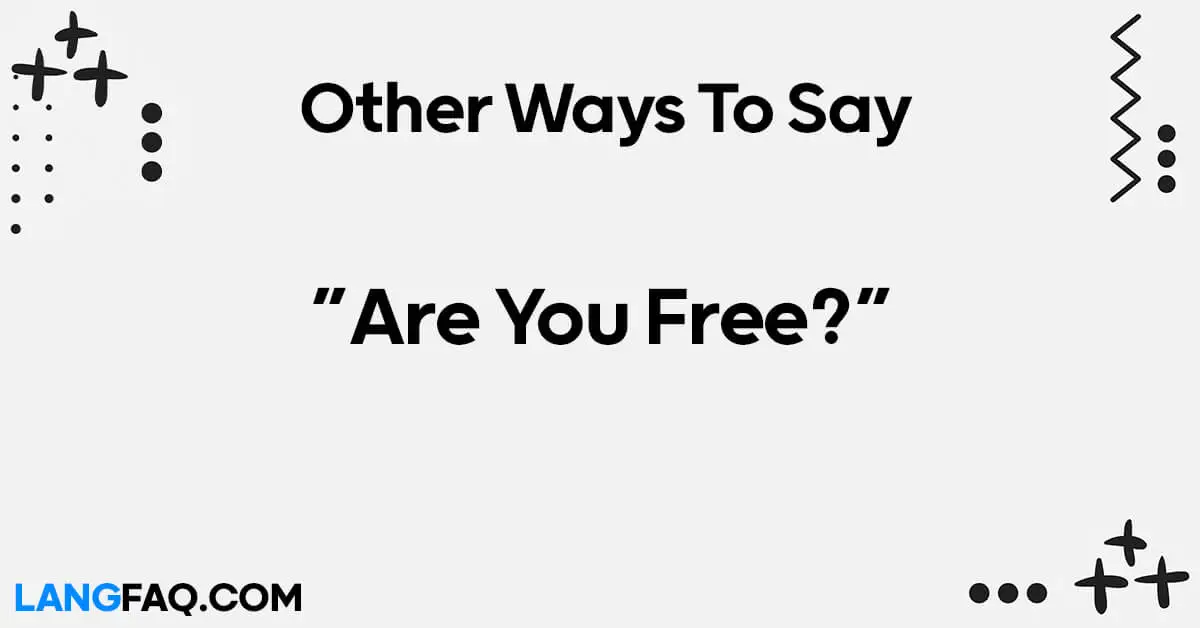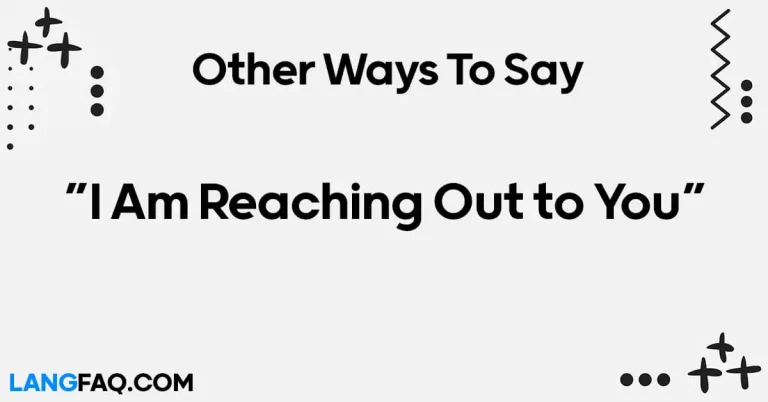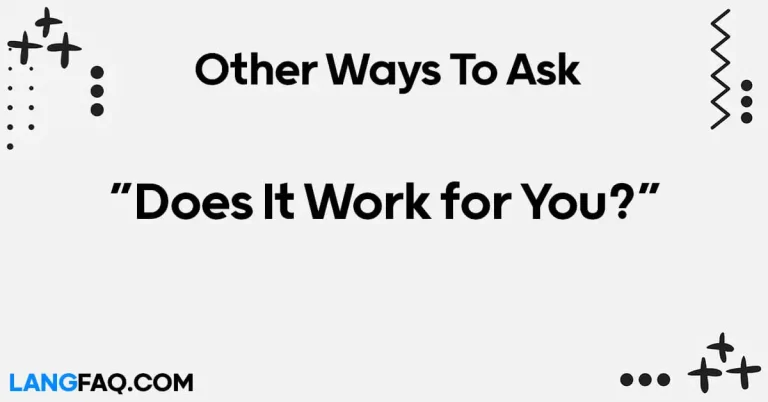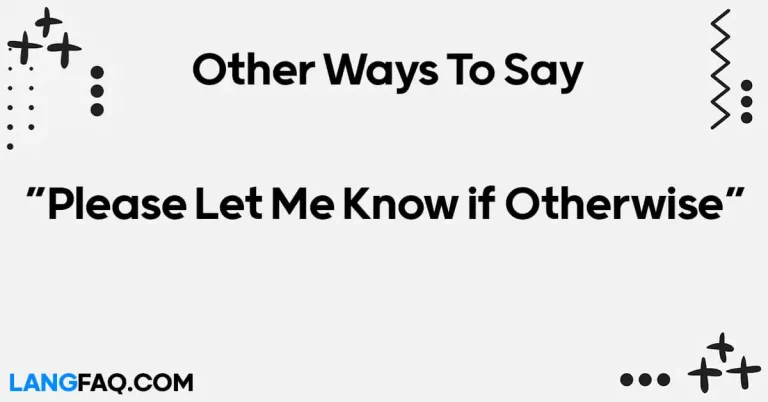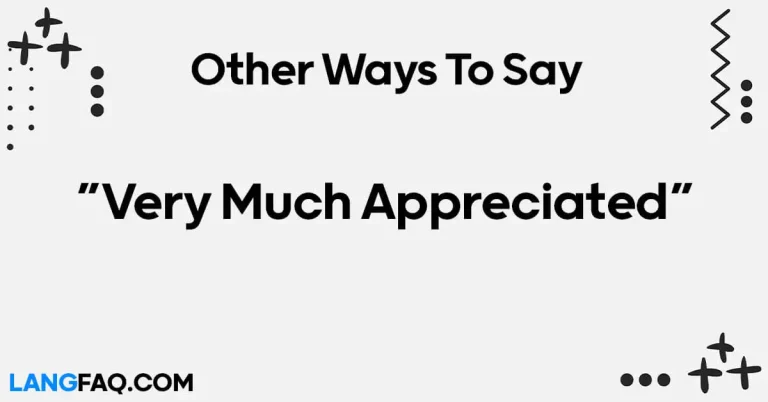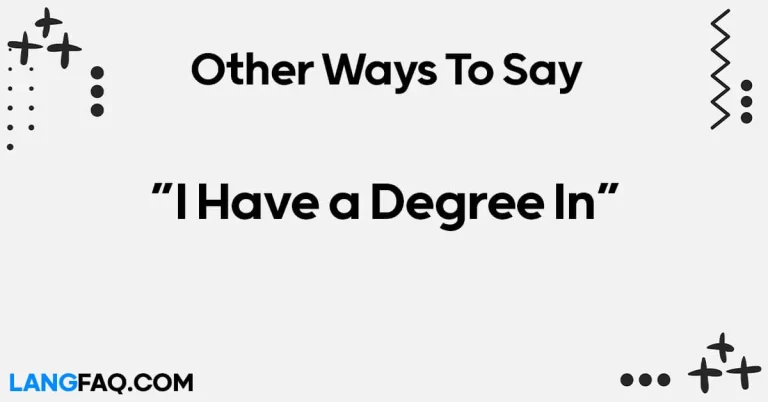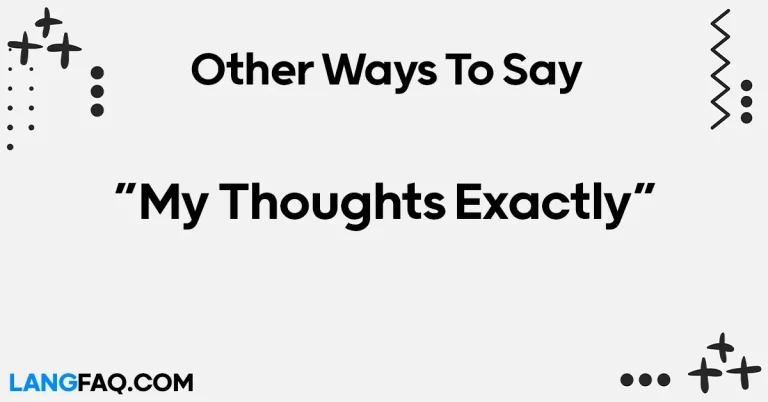In the realm of social interactions, asking someone if they are free is a common occurrence. However, the way we pose this question can significantly impact the tone of the conversation. This article delves into 12 unique ways to inquire about someone’s availability, providing a fresh perspective on initiating conversations. Let’s explore these alternatives and enhance your communication t
12 Other Ways to Ask “Are You Free?”
Here are 12 other ways to ask “Are you free?” with a variety of tones and styles:
- Available for a Chat?
- Got a Moment?
- Any Plans Right Now?
- Open for a Conversation?
- Can I Steal a Minute of Your Time?
- Free to Catch Up?
- Up for a Quick Talk?
- Got a Second to Spare?
- Ready for a Discussion?
- In the Clear for a Meeting?
- Free to Connect?
- Are You Open for a Quick Discussion?
| Expression | Meaning | Example |
|---|---|---|
| Available for a Chat? | Inquiring about someone’s availability for a conversation. | “Hey, are you available for a chat later?” |
| Got a Moment? | Politely asking if the person has time for a brief interaction. | “Hi there, do you got a moment to talk?” |
| Any Plans Right Now? | Checking if the person has ongoing commitments or activities. | “Quick question, any plans right now?” |
| Open for a Conversation? | Asking if the individual is receptive to engaging in a discussion. | “Wondering if you’re open for a conversation?” |
| Can I Steal a Minute of Your Time? | Politely seeking a small portion of the person’s time. | “Hope I can steal a minute of your time.” |
| Free to Catch Up? | Inviting the person to be available for a casual meeting or discussion. | “Are you free to catch up over coffee?” |
| Up for a Quick Talk? | Suggesting a short, informal discussion or conversation. | “Feeling chatty? Up for a quick talk?” |
| Got a Second to Spare? | Requesting a small amount of the person’s time for a quick exchange. | “Got a second to spare for a question?” |
| Ready for a Discussion? | Checking if the person is prepared or willing to engage in a discussion. | “Are you ready for a quick discussion?” |
| In the Clear for a Meeting? | Inquiring about availability for a more formal or planned meeting. | “Are you in the clear for our scheduled meeting?” |
| Free to Connect? | Asking if the person is available to connect or communicate. | “Hey, are you free to connect later?” |
| Are You Open for a Quick Discussion? | Seeking permission for a brief conversation or exchange of ideas. | “Are you open for a quick discussion now?” |
These alternative expressions offer a diverse range of ways to ask “Are you free?” Each phrase provides a unique nuance, allowing for flexibility in communication based on the context and relationship. Whether seeking a casual chat or planning a formal meeting, these alternatives cater to various conversational needs.
Is It Correct to Say “Are You Free?”?
Certainly, the phrase “Are you free?” is grammatically correct and widely used in English. It is a polite and straightforward way to inquire about someone’s availability or willingness to engage in an activity or conversation. Let’s delve into the correctness, usage, and nuances of this common expression.
Grammar and Structure:
The phrase adheres to proper English grammar. It consists of a subject (“you”), a helping verb (“are”), an adjective (“free”), and a question mark to denote inquiry. This structure aligns with standard sentence formation in English.
Everyday Usage:
“Are you free?” is a versatile and universally understood inquiry. It can be employed in various contexts, from making plans with friends to checking someone’s availability for a meeting or appointment.
Politeness and Formality:
The phrase is considered polite and suitable for both formal and informal situations. Its neutrality allows for application in professional environments, where a more formal tone may be required, as well as in casual conversations among friends.
Usage in Different Contexts:
- Professional Settings:
- Correct Usage: “Colleague, are you free for a quick discussion in the conference room?”
- Variation: “Excuse me, may I ask if you are available for a brief meeting?”
- Social Invitations:
- Correct Usage: “Hey, are you free for dinner on Friday?”
- Variation: “Would you be available to grab a coffee later?”
- Casual Interactions:
- Correct Usage: “Are you free to chat for a bit?”
- Variation: “Got a moment to spare for a quick catch-up?”
Common Alternatives:
While “Are you free?” is perfectly acceptable, using alternative expressions, as discussed earlier in this article, can add variety and nuance to your communication. Each alternative provides a slightly different tone or emphasis, allowing you to tailor your inquiry based on the context and relationship.
Professional Mail Example With “Are You Free?”
Subject: Quick Discussion – Are You Free?
Dear [Recipient’s Name],
I trust this message finds you well. As we approach the finalization of the project’s strategic plan, I would like to schedule a brief discussion to ensure we are aligned on key objectives and timelines.
Are you free for a quick discussion sometime this week? Your insights and input are crucial to the success of this project, and I believe a short meeting will help us address any outstanding questions or concerns.
Please let me know your availability, and we can coordinate a time that suits everyone involved. I appreciate your dedication to the project and look forward to our collaborative discussion.
Thank you for your time, and I eagerly await your response.
Best regards,
[Your Full Name] [Your Position] [Your Company] [Contact Information]
Available for a Chat?
In the realm of casual conversations, expressing availability for a chat is a friendly and approachable way to initiate communication. This phrase is versatile and can be used in various settings, from catching up with friends to informal work discussions.
Usage: Casual Setting:
“Hey there! Available for a chat later? I have some exciting news to share!”
Workplace Scenario:
“Hi colleagues, need to discuss the upcoming project. Anyone available for a quick chat after lunch?”
Email Sample:
Subject: Quick Chat Opportunity
Hi [Recipient],
I hope this email finds you well. I was wondering if you’re available for a chat later today or tomorrow. I’d love to discuss [topic]. Let me know a time that suits you.
Best regards,
[Your Name]
Variations:
- “Up for a Quick Chat?”
- “Free for a Quick Catch-Up?”
Dictionary Insight: According to Cambridge Dictionary, “chat” is an informal conversation, making this phrase suitable for friendly and relaxed discussions.
Tip: Ensure the context aligns with the informality of a chat. It’s ideal for non-urgent and light-hearted exchanges.
Got a Moment?
This phrase strikes a balance between friendliness and professionalism. It’s suitable for both casual conversations and slightly more formal situations, making it a versatile choice for various relationships.
Usage: Everyday Interaction:
“Hey, got a moment? I wanted to get your opinion on something.”
Professional Environment:
“Colleagues, got a moment for a quick team huddle to discuss the new project timeline?”
Email Sample:
Subject: Quick Question – Got a Moment?
Hello [Recipient],
I hope you’re well. I have a quick question and was wondering if you’ve got a moment to discuss [topic]. Your insights are valuable to me.
Best regards,
[Your Name]
Variations:
- “Can I Steal a Minute of Your Time?”
- “Mind If I Borrow a Moment?”
Grammar Tip: Using “got” is informal; if formality is required, replace it with “have.” For example, “Do you have a moment?”
Pros and Cons: The phrase is friendly but may be perceived as slightly informal in highly professional environments.
Any Plans Right Now?
This straightforward question is perfect for scenarios where you want to check someone’s availability without assuming they are free. It works well in both casual and professional contexts.
Usage: Friends Catching Up:
“Hey, haven’t seen you in ages! Any plans right now? Let’s grab a coffee.”
Professional Inquiry:
“Team, any plans right now? I need a quick brainstorming session for our upcoming project.”
Email Sample:
Subject: Quick Meeting – Any Plans Right Now?
Dear [Recipient],
I trust this email finds you well. Are you available for a quick meeting today? We need to discuss [topic]. Let me know a time that suits you.
Warm regards,
[Your Name]
Variations:
- “Up for a Quick Meeting?”
- “Free for a Spontaneous Discussion?”
Related Grammar Rule: Ensure to express the question clearly. For example, “Do you have any plans right now?” is more formal.
Pros and Cons: Directness and simplicity make this phrase effective, but it may feel too abrupt in very formal settings.
Open for a Conversation?
When aiming for a more formal or structured conversation, using the phrase “open for a conversation” signals professionalism. It’s suitable for both work-related discussions and more serious personal interactions.
Usage: Professional Setting:
“Mr. Johnson, are you open for a conversation regarding the new business proposal?”
Serious Personal Talk:
“Friend, I’ve noticed you’ve seemed a bit down lately. Are you open for a conversation about it?”
Email Sample:
Subject: Discussion Opportunity – Open for a Conversation?
Hello [Recipient],
I hope this message finds you in good spirits. I would like to discuss [topic] with you. Are you open for a conversation this week?
Best regards,
[Your Name]
Variations:
- “Ready for a Discussion?”
- “Available for a Professional Conversation?”
Dictionary Insight: “Conversation” implies a more structured and intentional exchange, fitting for serious discussions.
Tip: Choose this phrase when a more formal tone is necessary, ensuring the topic aligns with a serious or professional context.
Can I Steal a Minute of Your Time?
This playful yet polite phrase adds a touch of charm to your request for someone’s attention. It works well in various settings, especially when you want to make the interaction more engaging.
Usage: Friendly Request:
“Hey, can I steal a minute of your time? I’ve got something interesting to share!”
Workplace Interaction:
“Team, mind if I steal a minute of your time for a quick announcement?”
Email Sample:
Subject: Quick Chat – Can I Steal a Minute of Your Time?
Dear [Recipient],
I hope this email finds you well. Could I steal a minute of your time today or tomorrow? I have a brief but exciting update to share.
Best regards,
[Your Name]
Variations:
- “Mind If I Borrow a Moment?”
- “Can I Snatch a Minute?”
Related Grammar Rule: Ensure the playfulness of the phrase aligns with the relationship and context; it might be too informal for highly professional environments.
Pros and Cons: The charm in this phrase adds a personal touch, but it may be deemed too informal for strictly formal settings.
Free to Catch Up?
This phrase combines informality with a sense of camaraderie. It’s perfect for reconnecting with friends, colleagues, or acquaintances in a casual and relaxed manner.
Usage: Friendship Renewal:
“Long time no see! Are you free to catch up this weekend?”
Colleague Reconnection:
“Hey, it’s been a while since we caught up. Free to catch up for a coffee after work?”
Email Sample:
Subject: Catching Up – Are You Free?
Hello [Recipient],
I trust you’re doing well. It’s been some time since we caught up. Are you free for a quick coffee or lunch this week?
Warm regards,
[Your Name]
Variations:
- “Available for a Quick Reunion?”
- “Open for a Casual Meet-Up?”
Dictionary Insight: The phrase “catch up” implies reconnecting after a period of separation, making it ideal for renewing connections.
Tip: Use this phrase when you want to infuse a sense of camaraderie and warmth into your invitation.
Up for a Quick Talk?
Expressing a desire for a quick talk brings an element of informality to the conversation. This phrase is suitable for both personal discussions and more relaxed professional interactions.
Usage: Casual Chat:
“Hey, up for a quick talk? I’ve got a funny story to share.”
Team Discussion:
“Team, up for a quick talk on the recent project updates during our break?”
Email Sample:
Subject: Quick Discussion – Up for a Quick Talk?
Hi [Recipient],
I hope this message finds you well. Are you up for a quick talk today? I’d like to discuss [topic]. Let me know your availability.
Best regards,
[Your Name]
Variations:
- “Ready for a Brief Discussion?”
- “Game for a Quick Exchange?”
Grammar Tip: Ensure that the informality of the phrase aligns with the context. It might be too casual for strictly formal settings.
Pros and Cons: The phrase conveys a sense of informality and openness, but it may be perceived as too laid-back in certain professional environments.
Got a Second to Spare?
When time is of the essence, this phrase is a concise yet courteous way to check someone’s availability. It’s suitable for both personal and professional scenarios, especially when brevity is key.
Usage: Quick Question:
“Hey, got a second to spare? Need your opinion on something real quick.”
Workplace Inquiry:
“Team, got a second to spare for a brief update on the project status?”
Email Sample:
Subject: Quick Inquiry – Got a Second to Spare?
Dear [Recipient],
I hope this email finds you well. I have a quick inquiry and was wondering if you’ve got a second to spare today or tomorrow.
Best regards,
[Your Name]
Variations:
- “Mind If I Borrow a Second?”
- “Can I Steal a Moment of Your Time?”
Related Grammar Rule: Ensure the brevity of the phrase aligns with the urgency of the situation. It’s best suited for quick, non-intrusive requests.
Pros and Cons: The phrase is effective for time-sensitive situations but might feel too hurried for more relaxed conversations.
Ready for a Discussion?
When a more formal or structured conversation is required, “Ready for a Discussion?” sets a professional tone. It’s suitable for both work-related talks and serious personal conversations.
Usage: Workplace Inquiry:
“Colleagues, ready for a discussion on the proposed changes to our project strategy?”
Serious Personal Talk:
“Friend, I’ve noticed you’ve seemed a bit down lately. Are you ready for a discussion about it?”
Email Sample:
Subject: Discussion Invitation – Ready for a Discussion?
Hello [Recipient],
I trust this email finds you in good spirits. I would like to discuss [topic] with you. Are you ready for a discussion this week?
Best regards,
[Your Name]
Variations:
- “Open for a Professional Exchange?”
- “Available for a Structured Conversation?”
Dictionary Insight: “Discussion” implies a more intentional and formal exchange, making it suitable for serious or professional contexts.
Tip: Choose this phrase when a more formal tone is necessary, ensuring the topic aligns with a serious or professional context.
Can I Snatch a Minute?
This phrase adds a playful twist to the request for someone’s time, infusing a bit of humor into the interaction. It’s suitable for informal settings where a touch of light-heartedness is welcomed.
Usage: Playful Request:
“Hey there! Can I snatch a minute of your time for a quick update?”
Team Engagement:
“Team, mind if I snatch a minute for a fun icebreaker activity?”
Email Sample:
Subject: Quick Update – Can I Snatch a Minute?
Hi [Recipient],
I hope this message brings a smile to your face. Can I snatch a minute of your time today for a quick update? It won’t take long!
Best regards,
[Your Name]
Variations:
- “Mind If I Grab a Quick Moment?”
- “How About I Steal a Minute?”
Grammar Tip: The phrase relies on a playful tone, making it suitable for informal interactions. Ensure the mood is appropriate for the setting.
Pros and Cons: The humor in this phrase can lighten the mood, but it may not be suitable for strictly formal environments.
Free for a Quick Reunion?
Expressing a desire for a reunion adds a sense of warmth and nostalgia to your invitation. This phrase is excellent for reconnecting with friends, colleagues, or acquaintances in a casual and friendly manner.
Usage: Friendship Renewal:
“Long time no see! Are you free for a quick reunion this weekend?”
Colleague Reconnection:
“Hey, it’s been a while since we caught up. Free for a quick reunion for a coffee after work?”
Email Sample:
Subject: Catching Up – Are You Free for a Quick Reunion?
Hello [Recipient],
I trust you’re doing well. It’s been some time since we caught up. Are you free for a quick reunion over coffee or lunch this week?
Warm regards,
[Your Name]
Variations:
- “Available for a Casual Meet-Up?”
- “Up for a Friendly Get-Together?”
Dictionary Insight: “Reunion” implies a coming together after a period of separation, evoking a sense of joy and familiarity.
Tip: Use this phrase when you want to infuse a sense of camaraderie and warmth into your invitation.
Ready for a Brief Discussion?
For situations that require a bit more formality than a casual chat, “Ready for a Brief Discussion?” strikes the right balance. It’s ideal for both professional discussions and more serious personal exchanges.
Usage: Workplace Interaction:
“Team, ready for a brief discussion on the new project updates during our break?”
Serious Personal Talk:
“Friend, I’ve noticed you’ve seemed a bit down lately. Are you ready for a brief discussion about it?”
Email Sample:
Subject: Discussion Opportunity – Ready for a Brief Discussion?
Hello [Recipient],
I hope this message finds you well. I would like to discuss [topic] with you. Are you ready for a brief discussion this week?
Best regards,
[Your Name]
Variations:
- “Up for a Quick Exchange of Ideas?”
- “Open for a Concise Conversation?”
Related Grammar Rule: Ensure the formality of the phrase aligns with the context. It strikes a balance between casual and professional.
Pros and Cons: The phrase is versatile, suitable for both professional and personal contexts, but it may feel slightly formal for very casual interactions.
FAQs
Can I use these alternatives in professional settings?
Absolutely! While some options may be more casual, there are formal alternatives suitable for professional engagements.
Are these alternatives culturally appropriate?
Yes, the provided alternatives are versatile and can be adapted to various cultural contexts.
Should I always suggest an activity with the question?
Not necessarily. Some options focus solely on availability, while others include a suggested activity. Choose based on the nature of your relationship and the context.
Is it okay to use these alternatives in text messages?
Certainly! These alternatives work well in both verbal and written communication.
How can I gauge which alternative to use?
Consider the nature of your relationship, the context of the conversation, and the level of formality required.
Will these alternatives work in initiating both personal and professional conversations?
Absolutely. The versatility of these alternatives makes them suitable for a wide range of interactions.
Conclusion
Enhancing your communication skills involves exploring diverse ways to ask common questions. The 12 alternatives presented here offer a spectrum of options, allowing you to tailor your approach based on the context and relationship. Experiment with these alternatives and transform your everyday conversations into engaging and memorable interactions.

